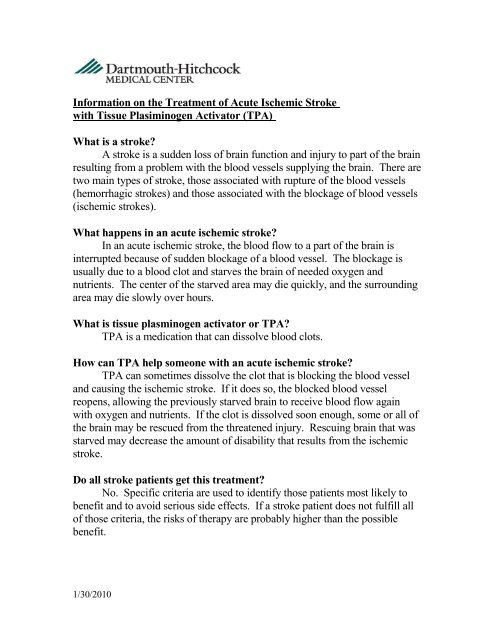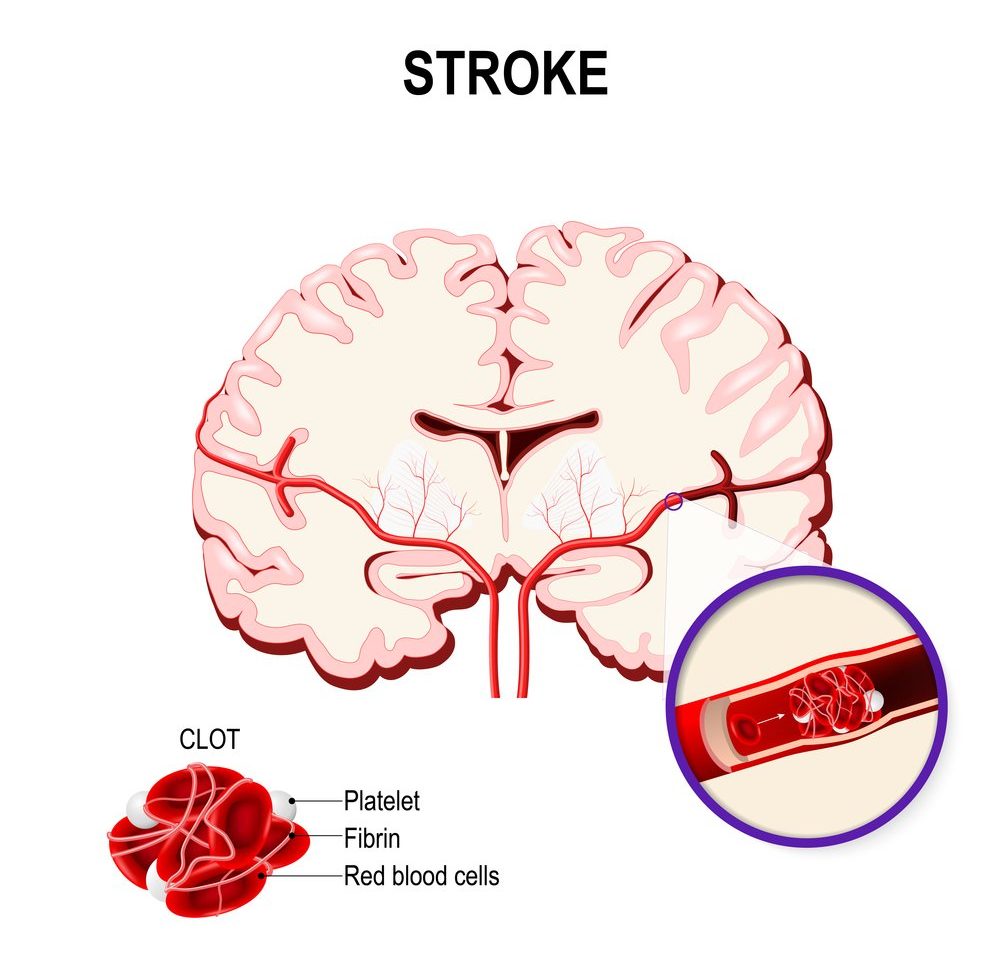Tpa Clot Dissolver
Tissue Plasminogen Activator (tPA) is a medication that dissolves blood clots. It is called a thrombolytic agent or more commonly referred to as the “clot buster.” It is an intravenous or IV medication usually given through a catheter inserted into a vein in the arm. TPA is a thrombolytic or a “Clot Buster” drug. This clot buster is used to break-up the clot that is causing a blockage or disruption in the flow of blood to the brain and helps restore the blood flow to the area of the brain. It is given by intravenous (IV), not by mouth. Blood thinners don’t dissolve the clot, but they can stop it from getting bigger and keep new ones from forming. That gives your body time to break up the clot. Different blood thinners work in.
Researchers at Emory University School of Medicine have identified a protein released by neurons while the brain is recovering from a stroke.
The results were published online Oct. 22 in Journal of Neuroscience.
The protein, called urokinase-type plasminogen activator or uPA, has been approved by the FDA to dissolve blood clots in the lungs. It has been tested in clinical trials in some countries as a treatment for acute stroke.
The Emory team’s findings suggest that in stroke, uPA’s benefits may extend beyond the time when doctors’ principal goal is dissolving the blood clot that is depriving the brain of blood.
Instead, uPA appears to help brain cells recover from the injuries induced by loss of blood flow. Treating mice with uPA after an experimental stroke can improve their recovery of motor function, the researchers found.
uPA (urokinase-type plasminogen activator) and tPA (tissue-type plasminogen activator), the drug that is the only approved treatment for acute stroke, have similar names, because they both act biochemically to activate plasmin, which directly dissolves blood clots.
“We are finding that uPA and tPA do very different things in the brain. We see that uPA is released during the recovery phase of a stroke over several hours,” says lead author Manuel Yepes, MD, associate professor of neurology at Emory University School of Medicine. “This is in sharp contrast with tPA, which is released from neurons within milliseconds of hypoxia or ischemia [loss of blood flow].”
Co-first authors of the paper are postdoctoral fellows Fang Wu, PhD, and Ramiro Echeverry, MD, and pregraduate student Marcela Catano.
The Emory team found that mice that lack uPA do not regain as much forelimb strength after a one hour blockage of the middle cerebral artery, compared with control mice. This suggests that uPA produced within the brain is promoting recovery. In addition, immediate treatment with supplementary uPA after a stroke can boost the recovery of forelimb strength, the researchers found.
uPA does not have a direct effect on neurons when they are being deprived of oxygen and nutrients. Rather, uPA appears to help remodel dendritic spines, structures on neurons that are critical for communication. After a stroke, dendritic spines are replaced by swelling on neurons that survive but are close to the damaged area of the brain.
In cultured neurons, uPA can induce the re-emergence of dendritic spines after toxic injury that mimics the effects of a stroke. uPA seems to help the neurons’ internal skeletons reorganize. The part of the uPA protein that acts in dissolving blood clots is not necessary for this effect, but uPA’s interaction with its receptor uPAR is required.
Yepes says his team is testing whether treatment with uPA can still provide benefits in mice when it is given some time after an experimental stroke, which could provide some hints as how it could best be used clinically.
The research was supported by the National Institute of Neurological Disorders and Stroke (NS062073 and NS079331) and Veterans Adminstration Merit Award BX000474.
Reference: F. Wu et al. Urokinase-Type Plasminogen Activator Promotes Dendritic Spine Recovery and Improves Neurological Outcome Following Ischemic Stroke. J. Neurosci, 34: 14219-14232 (2014).
Generic Name: alteplase (AL te plase)
Brand Name:Activase, Cathflo Activase
Dosage Forms: injectable powder for injection (2 mg); intravenous powder for injection (100 mg; 50 mg)
What is alteplase?
Alteplase is a thrombolytic (THROM-bo-LIT-ik) drug, sometimes called a 'clot-busting' drug. It helps your body produce a substance that dissolves unwanted blood clots.
Alteplase is used to treat a stroke caused by a blood clot or other obstruction in a blood vessel. Alteplase is also used to prevent death from a heart attack (acute myocardial infarction).
Alteplase is also used to treat a blood clot in the lung (pulmonary embolism).
Alteplase is also used to dissolve blood clots that have formed in or around a catheter placed inside a blood vessel. This improve the flow of medicines injected in through the catheter, or blood drawn out through the catheter.
Alteplase may also be used for purposes not listed in this medication guide.
Important Information
Alteplase increases your risk of severe or fatal bleeding, especially from a surgical incision, or from the skin where a needle was inserted. Seek emergency help if you have any bleeding that will not stop.
Before taking this medicine
You should not be treated with alteplase if you are allergic to it, or if you have:
active bleeding inside your body;
a brain tumor or aneurysm (dilated blood vessel);
a history of head injury or surgery on your brain or spinal cord within the past 3 months; or
severe or uncontrolled high blood pressure;
a bleeding or blood clotting disorder such as hemophilia;
bleeding inside your brain (if you are receiving alteplase to treat a stroke); or
a recent history of stroke (if you are receiving alteplase for pulmonary embolism).
If possible before you receive alteplase, tell your doctor if you have ever had:
any type of stroke;
bleeding in your brain, stomach, intestines, or urinary tract;
high blood pressure;
heart problems;
an infection of the lining of your heart (also called bacterial endocarditis);
a serious injury or major surgery;
severe bruising or infection around a vein where an IV was placed;
an organ biopsy;
eye problems caused by diabetes;
liver or kidney disease; or
if you are pregnant or breastfeeding.
In an emergency situation it may not be possible to tell your caregivers if you are pregnant or breast-feeding. Make sure any doctor caring for your pregnancy or your baby knows you have received alteplase.
How is alteplase given?

Alteplase is given as an infusion into a vein. A healthcare provider will give you this injection.
Alteplase is usually given within 3 hours after the first signs of stroke or heart attack symptoms. Your breathing, blood pressure, oxygen levels, and other vital signs will be watched closely.
You will also be watched closely for several hours after receiving alteplase, to make sure you do not have an allergic reaction to the medication.
When used to clear blood clots from a catheter, alteplase is given in 1 or 2 doses.
Your doctor may prescribe a blood thinner or other medication to help prevent future blood clots. Carefully follow all dosing instructions. These medications can make it easier for you to bleed, even from a minor injury.
What happens if I miss a dose?
Because you will receive alteplase in a clinical setting, you are not likely to miss a dose.
What happens if I overdose?
Seek emergency medical attention or call the Poison Help line at 1-800-222-1222.
What should I avoid after receiving alteplase?
Ask your doctor before taking aspirin or ibuprofen (Motrin, Advil) shortly after you have received alteplase. These medications can increase your risk of bleeding.
Avoid activities that may increase your risk of bleeding or injury. Use extra care to prevent bleeding while shaving or brushing your teeth.

Alteplase side effects
Get emergency medical help if you have signs of an allergic reaction:hives; difficult breathing; swelling of your face, lips, tongue, or throat.
Alteplase increases your risk of bleeding, which can be severe or fatal. Call your doctor or seek emergency medical attention if you have bleeding that will not stop. Bleeding may occur from a surgical incision, or from the skin where a needle was inserted during a blood test or while receiving injectable medication. You may also have bleeding on the inside of your body, such as in your stomach or intestines, kidneys or bladder, brain, or within the muscles.
Call your doctor or get emergency medical help if you have signs of bleeding, such as:
sudden headache, feeling very weak or dizzy;
bleeding gums, nosebleeds;
easy bruising;
bleeding from a wound, incision, catheter, or needle injection;
bloody or tarry stools, coughing up blood or vomit that looks like coffee grounds;
red or pink urine;
heavy menstrual periods or abnormal vaginal bleeding; or
sudden numbness or weakness (especially on one side of the body), slurred speech, problems with vision or balance.
Also call your doctor at once if you have:
chest pain or heavy feeling, pain spreading to the jaw or shoulder, nausea, sweating, general ill feeling;
swelling, rapid weight gain, little or no urination;
severe stomach pain, nausea, and vomiting;
darkening or purple discoloration of your fingers or toes;
very slow heartbeats, shortness of breath, feeling light-headed;
sudden severe back pain, muscle weakness, numbness or loss of feeling in your arms or legs;
increased blood pressure--severe headache, blurred vision, pounding in your neck or ears, anxiety, nosebleed; or
pancreatitis--severe pain in your upper stomach spreading to your back, nausea and vomiting.
Bleeding is the most common side effect of alteplase.
This is not a complete list of side effects and others may occur. Call your doctor for medical advice about side effects. You may report side effects to FDA at 1-800-FDA-1088.
What other drugs will affect alteplase?
Tpa Clot Buster
Tell your doctor about all your other medicines, especially:
any medication used to treat or prevent blood clots;
a blood thinner (heparin, warfarin, Coumadin, Jantoven); or
NSAIDs (nonsteroidal anti-inflammatory drugs)--aspirin, ibuprofen (Advil, Motrin), naproxen (Aleve), celecoxib, diclofenac, indomethacin, meloxicam, and others.
This list is not complete. Other drugs may affect alteplase, including prescription and over-the-counter medicines, vitamins, and herbal products. Not all possible drug interactions are listed here.
Further information
Remember, keep this and all other medicines out of the reach of children, never share your medicines with others, and use this medication only for the indication prescribed.
Always consult your healthcare provider to ensure the information displayed on this page applies to your personal circumstances.
Copyright 1996-2021 Cerner Multum, Inc. Version: 3.01.

More about alteplase

- During Pregnancy or Breastfeeding
Consumer resources
Other brands:Activase, Cathflo Activase